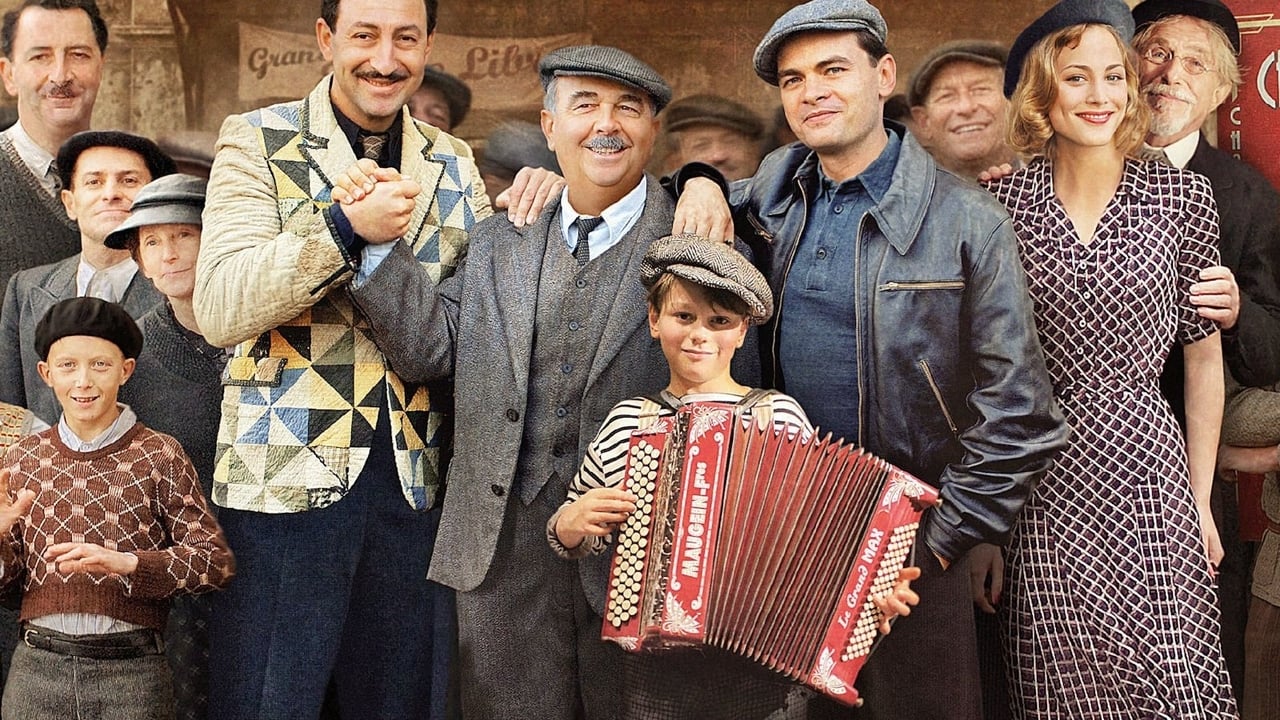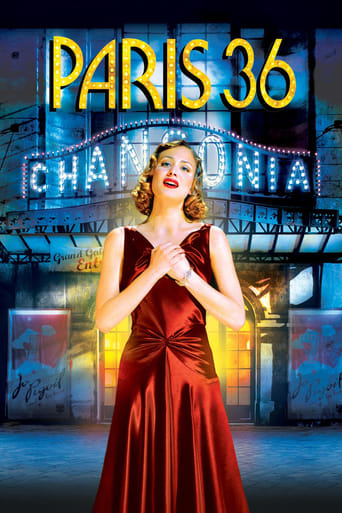Kidskycom
It's funny watching the elements come together in this complicated scam. On one hand, the set-up isn't quite as complex as it seems, but there's an easy sense of fun in every exchange.
Keeley Coleman
The thing I enjoyed most about the film is the fact that it doesn't shy away from being a super-sized-cliche;
Benas Mcloughlin
Worth seeing just to witness how winsome it is.
angelikafauve
I voted for 6 because the film was overloaded. Too many characters and subplots - especially those with the French mafia sometimes called "apaches", were somewhat complicated and puzzling - not meaning that some other,especially those with communists and fascists were'not at least somewhat naive and clumsy. I recommend this film because there is very good music inside - type of waltz, nice decoration of the sets with an exact theater of the 30s Belle Epoque. As for the externals, all the way long we see Paris with all those rainy-wet pavements, an eternal snow, always a heavy rain, it's picturesque attics looking to the sky, it's old buildings terraces viewing the Tour Eiffel and as we approach to the end, some scenes luxurious as they are, evoke Paris rich and fancy apartments at the "quartiers chic" as they are called. The scenes of the music-hall are according to the typical tradition of French cabaret, enough satisfying as they recall Lido, Follies Bergeres, Moulin Rouge cabarets. The singing also refers to top french singers - Edith Piaf, Maurice Chevalier, Charles Trenet. A very satisfying role and performance, is of Pigoil's - music-hall manager, son - a young boy who plays the accordion in the streets of Paris trying to earn some money with which buys some sausages as a supper offered to his father's lonely drinking - caused by his wife's cruel abandonment for the music-hall tenor. I think this film to it's whole, was not bad directed, with a nice Parisian atmosphere. It will make you surely spend two relaxing and pleasant hours.
rba1953
This movie was a surprising little gem. I knew nothing about it and went with some friends yesterday on a whim. It was beautifully photographed and the rendition of 1936 Paris seemed quite authentic. The costumes were exquisite, the story is engaging, and of all the characters were genuine. The scenes in the theater left me smelling the greasepaint I think this movie captured me because I was once heavily involved in local, amateur theater where we knocked ourselves out putting on shows just for the fun of it. I could identify with these characters struggling to eke out a living and dreaming of fame and success. The contrast of such joyous activities and the hopes of Pigoil, Douce and Jacky, amongst others against those dark times in Europe gives this movie a wonderful, entertaining balance. It is well worth seeing.
writers_reign
Imagine you've got a hard-on for thirties Hollywood - Fred, Ginger, the Golddiggers, Bill Powell, Myrna Loy, Frank Capra, Carole Lombard, Jean Arthur, Screwball Comedy, Katie Hepburn etc - and you check out your local Multiplex and damned if someone hasn't turned out a perfect pastiche. Alas, you'll have to make do with imagination because, let's face it, you just can't get the staff; no one currently writing and/or directing out of Hollywood has the affection, empathy, love and let's call a spade a spade, Respect for yesterday. This is not to say that Clint Eastwood, for example is a bad director, far from it, but he's not interested in that kind of stuff and there's no reason he should be. If, on the other hand your hard-on is for French films of the thirties, if in other words you lapse into drool mode at the mention of Arletty, Gabin, Prevert, Carne, Duvivier, Darrieux, Carette, Dalio, Raimu, Qai des Brumes, Hotel du Nord, Spaak, Jeanson, Aurenche et al then, mon amis, you have just died and gone to heaven, Hog Heaven yet because four years after his international hit Les Choristes, Christophe Barratier has come up with a Faberge egg of a movie that evokes all that's best about the era. The plot - a Music Hall is forced to close and the employees decide to run it themselves - is a nod to Prevert's Le Crime de Monsier Lange when it was a publishing house that got made over and indeed the Popular Front (in which Prevert was active) is very much in evidence. Gerard Jugnot is excellent as is Pierre Richard and Clovis Cornillac is be-capped a la Gabin albeit light years away from him in talent and charisma. Did I say there were songs as well? You better believe it. All in all a gem.
daphne4242
This is a beautiful film which captures much of the feel of great French films of the 1930's. It's also a love poem to Paris. It helps that Nora Arnzeder is so gorgeous and all the actors give strong performances. The story is really a fairy story with a political twist. A small music hall in Paris is forced to close down in 1936. Because this is is the year of the Popular front in France, when factory occupations spread across the country, the performers decide to take over the theatre and run it themselves. They get an extraordinary stroke of luck when a young girl, Douce, turns up hoping to get a break in the theatre. Double luck because not only is she a brilliant performer but the local boss fancies her and allows the theatre to stay open. There are some serious themes touched on, including the pervasive anti-Semitism of the extreme Right at this period but the film is overwhelmingly joyous, which is as it should be. The Popular Front didn't happily, which was a tragedy for France, but this film does, as do all good fairy tales.

